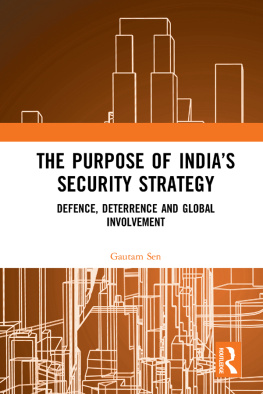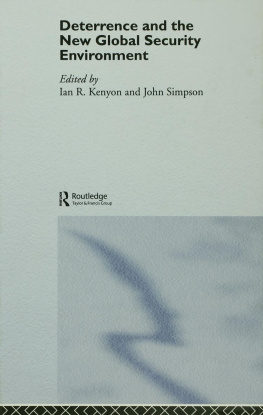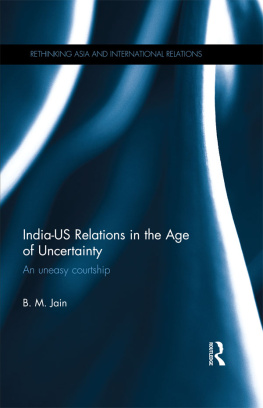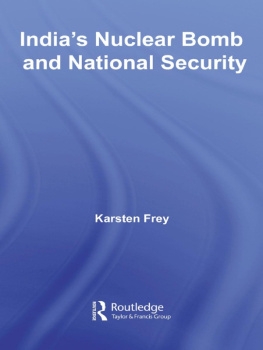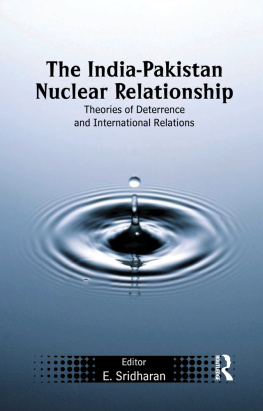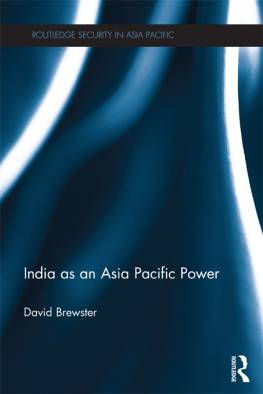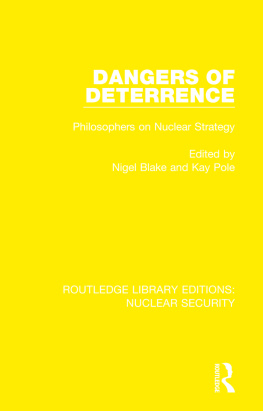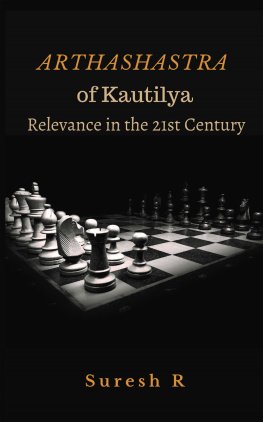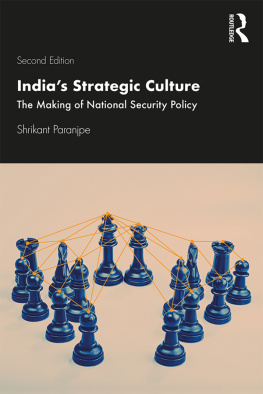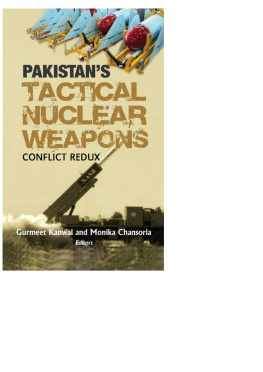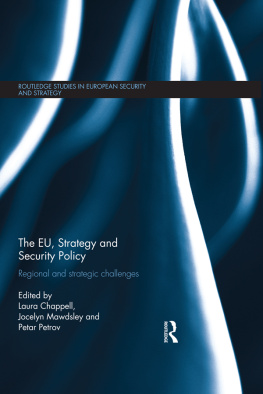THE PURPOSE OF INDIAS SECURITY STRATEGY
Defence, Deterrence and Global Involvement
This book comprises the journey of the Indian nation state and its tryst with destiny, where successive political leaderships, while governing India, contributed to a better understanding of the idea of India, its political and strategic culture, and the role that its military has had to play to develop that culture. Hence, the journey has been from the backwaters of defensive defence to create a credible deterrence capacity as well as a doctrine to implement the same through political will and enter the domain of global involvement in the strategic, non-strategic as well as non-traditional areas of security. Thus, the title of the book The Purpose of Indias Security Strategy: Defence, Deterrence and Global Involvement. It is hoped that this book will serve as a referral document to understand the polemics of the development of a strategic culture in India for an era which will be dominated by the information age and artificial intelligence, without forgetting that the Indian political leadership has come of age to understand the role of the military in the process of nation building.
Gautam Sen is presently Distinguished Visiting Fellow at the Centre for Land Warfare Studies, Delhi, Adjunct Professor at the National Institute of Advance Studies, Bangalore, Visiting, Founder Member and Member Governing Council, Centre for Advance Strategic Studies, Pune, Member Executive Council and Scholar in Residence at Allahabad State University, Allahabad.
THE PURPOSE OF INDIAS SECURITY STRATEGY
Defence, Deterrence and Global Involvement
GAUTAM SEN
First published 2019
by Routledge
2 Park Square, Milton Park, Abingdon, Oxon OX14 4RN
and by Routledge
52 Vanderbilt Avenue, New York, NY 10017
Routledge is an imprint of the Taylor & Francis Group, an infirma business
2020 Gautam Sen and KW Publishers Pvt Ltd
The right of Gautam Sen to be identified as author of this work has been asserted by her in accordance with sections 77 and 78 of the Copyright, Designs and Patents Act 1988.
All rights reserved. No part of this book may be reprinted or reproduced or utilised in any form or by any electronic, mechanical, or other means, now known or hereafter invented, including photocopying and recording, or in any information storage or retrieval system, without permission in writing from the publishers.
Trademark notice: Product or corporate names may be trademarks or registered trademarks, and are used only for identification and explanation without intent to infringe.
Print edition not for sale in South Asia (India, Sri Lanka, Nepal, Bangladesh, Pakistan or Bhutan)
British Library Cataloguing-in-Publication Data
A catalogue record for this book is available from the British Library
Library of Congress Cataloging-in-Publication Data
A catalog record for this book has been requested
ISBN: 978-0-367-43592-9 (hbk)
ISBN: 978-1-003-00454-7 (ebk)
Typeset in Rhomus, Utopia
by KW Publishers
For
Anil Athale, Arun Nanda, Balli Jaiswal, Balraj Nagal, Jyoti Raina, Noble Thamburaj, Shammi Dhillon, Vijay Singh and their Coursemates at the Indian Military Academy
CONTENTS
PART I
FROM DEFENCE TO DETERRENCE 194779
PART II
INDIAS SECURITY STRATEGY AND GLOBAL INVOLVEMENT 19802017
Appendix
Indias Defence Strategy in the Next Decade
Indias defence policy is known more by its absence in a concrete form shared with the citizens rather than debate or discussion amongst the strategic community or other nations. India has been subjected to five wars or conflicts, not of its own choosing, and now is countering a terror proxy war. In spite of these inflictions, there has been no declared national security strategy or defence policy/strategy.
Prof Gautam Sen has now examined the past 70 years to craft this book, to elucidate on the purpose of Indias security strategy: defence, deterrence and global involvement, and on the contours and character that Indias defence policy has acquired. The book provides analysts and students a deep insight into the strengths and weaknesses of the Indian political leadership, military hierarchy, technical and generalist bureaucracy. The evolution of the security strategy was not the result of a long-term view of the national interests but a function of compulsion, resource constraints and inadequate grooming of decision-makers at the strategic level.
The political and strategic leadership will find the book extremely useful as a guide to decision-making and examining complex issues to arrive at a positive and futuristic policy catering to an uncertain, ambiguous and rapidly changing security paradigm.
As Indias economy grows and it takes the stage at the regional and global planes, there will be a need to adopt policies that work on undefined challenges and indeterminate time lines. This research work will help policy-makers extrapolate and infer, to arrive at decisions in the national interest. I am certain that readers will find this work extremely valuable and enlightening.
Prof Gautam Sen, a Distinguished Visiting Fellow at the Centre for Land Warfare Studies (CLAWS) has been a guide, friend and philosopher to many scholars at the think-tank. His intellectual and theoretical contributions have enriched CLAWS and created an atmosphere of inquiry.
Lt Gen Balraj Singh Nagal (Retd)
Director
Centre for Land Warfare Studies, New Delhi
It is customary for any author to acknowledge the support of those who have contributed in the writing of a book. However, in this book of mine, I employed no research assistant or even a typist to produce the manuscript. Intellectually, of course, the catalyst has its mooring in the past: Gen E L M Burns of the Canadian Army and my mentor when I was a graduate student at McGill and Carleton Universities in the mid-Seventies of the last century. Gen Burns was the Commander of the UN Peace-keeping Force and had returned to Canada he was a great proponent of the role of the armed forces in nation-building. The second was Professor Peter Nailor, Professor of Naval History at the Royal Naval College, Greenwich, and my tutor at Carleton, who taught me the three Rs of naval strategy. The third being Professor Susan Strange who, as my host Professor at the European University Institute where I was a Jean Monnet Fellow, educated me to bridge the gap between Strategic Studies and International Political Economy. To all three, I remain indebted, morally and intellectually.
No research can be complete without the love and support of the family. Arpita, my daughter, and Dilip her husband, have, over the past ten years, ensured that I am not inconvenienced in the area of financial management, environmentally, or from the burden of participating in social obligations. I, therefore, have had a charmed existence of enjoying the magnificent solitude to think 24X7. No academic could have asked for more.
I hold no one responsible for any shortcomings in my writing and I am solely responsible for anything that is found wanting. This book is dedicated to my former students and all their coursemates at the Indian Military Academy where I taught for nearly three years. One of my teachers often reminded me during my graduate studies days that the test of a teacher is when his students climb over his shoulders and prove to be better than the teacher. My students have proved that measure to my complete satisfaction. Those whom I taught in the Army institution rose to hold the highest offices and those who were my students in the university have held, and continue to hold, the highest positions in academia.

